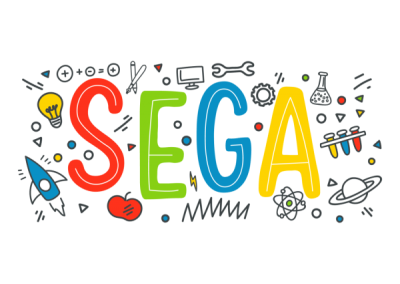SEGA
Project title: Shaping STEAM education for young children through gaming
Duration: 28.02.2022 – 27.02.2025
Project number: 2021-1-PL01-KA220-SCH-000029852
Programme: Erasmus +
Key Action: Cooperation partnerships in school education
Coordinator: WYZSZA SZKOLA BIZNESU I NAUK O ZDROWIU - Poland
Website: under construction
Facebook: https://www.facebook.com/profile.php?id=100086466433176
Keywords: Key competences development ; New learning and teaching methods and approaches ; Pedagogy and didactics
OVERWIEV
Early STEAM education can promote ongoing academic success, and children who learn STEAM concepts throughout their education are better prepared to meet increasingly technology-focused professional requirements. Though there is little disagreement about the importance of STEAM education, schools face challenges related to providing adequate STEM training for Early childhood educators. Research has shown that providing meaningful hands-on STEAM experiences for early childhood children positively impacts their perceptions and dispositions towards STEAM. When children are introduced to STEAM at an earlier age, there
tends to be less gender-based stereotypes and fewer obstacles regarding STEAM. Adequate training of preschool educators in teaching STEM concepts is critical. When faced with this new emphasis on STEAM teachers are often intimidated, and reveal negative dispositions as a result of their lack of training. The SEGA project addresses the lack of sufficient STEAM teacher training programs and STEAM resources for ECE educators through the implementation of gamification. Using Gamification in the Early learning classroom can help educators implement STEAM activities and turn play into learning, engage and motivate students to love
science. aims to support Early Childhood Educators (ECE) in the implementation of STEAM (Science Technology , Engineering, Art, Mathematics) activities in the classroom through a gamified approach. The definition of early childhood education (ECE) used in this proposal describes education for children from pre- Kindergarten through the first grade of primary education.The project will achieve this through a three fold approach:
- the development of a digital toolkit with resources and support material designed for the Early Education classroom.
- the development of a Gamified story book, guiding educators and students through playful teaching and learning path
- development of online STEAM training cources addressed to ECE.
The Toolkit will:
- include digital material that will offer the ECE Educators the necessary theoretical background in order to implement STEAM activities in the ECE and kindergarten classrooms,
- include frameworks appropriate for this age group and offer STEAM lesson plan examples that will focus on transversal skills.
The Gamified story book will guide teachers and help students cultivate STEAM related skills. Students will work collaboratively to solve missions related to real life problems focusing also on inclusion and sustainability. Students will undertake the main characters’ roles of the story and make different choices that will lead them to different outcomes. They will virtually travel to a part of Europe and will be given missions to make the place a sustainable habitat. The Gamified story book will be in a digital format however activities will physically extend into the classroom actively engaging students to solve problems and create with simple materials.
The ECE STEAM self pace training courses will address the lack of sufficient training of educators for early childhood educators. They will be self paced open access and culture a supportive learning environment, including video lectures, quizzes and self-reflection activities.
PROJECT RESULTS
The SEGA Project is expected to produce a wide set of tangible outcomes. The most relevant include:
SEGA Toolkit
The Toolkit is a repository of STEAM lesson plans for ECE, ready to be applied in the classroom. The repositorywill be created through the accumulation of resources based on a desk research both literature review and qualitative studies. Apart from the lesson plans, the existing theoretical models of ECE STEAM Education will be reviewed and a new framework will be designed and proposed. This framework, along with the State of the Art of
the field will be resources available through the Toolkit. The aim is to produce a collective resource for those interested on the field and to act as a reference point for them.
SEGA Gamebook
The gamebook is a learning resource for ECE which combines storytelling and gamification for STEAM Education in ECE. An interactive story will be designed which will allow for different evolvements and endings, based on the students’ responses to provided missions (an integral part of the story). The story will be about a traveller in Europe who wishes to create a sustainable habitat of an area he/she decides to settle in. Five roles (corresponding to the STEAM elements) will be involved, allowing for collaborative STEAM Education.
Gamebook mini guide
The Guide is a document that will provide material and instructions on how to explore and utilize the Gamebook. It will include ideas for class group formation, instructions on how to go through the story and use the interaction patters and tools (e.g. QR Codes) and ideas for alternative implementation approaches.
Training Course
The Training Course will be based on the experience gained from the preceding results. It will include introductory video lectures, along with material appropriate for distance learning in the form of a mini MOOC in order to create a self-paced learning course. It will be addressed to stakeholders (including university students and parents) and it will present in a systematic way the ECE STEAM Education field as a training resource for those who are not familiar with the field.
PROJECT PARTNERS
- PROJETO SCHOLE LDA - Portugal
- PANEPISTIMIO DYTIKIS MAKEDONIAS - Greece,
- ADVANCIS-BUSINESS SERVICES LDA - Portugal
- EKPAIDEUTIKOS OMILOS ANATOLIA - Greece
- ATERMON B.V. – The Netherlands
How to contact us?
Contact to the institutional coordinator: j.komorek@wsbinoz.pl
Project Newsletter no 1



